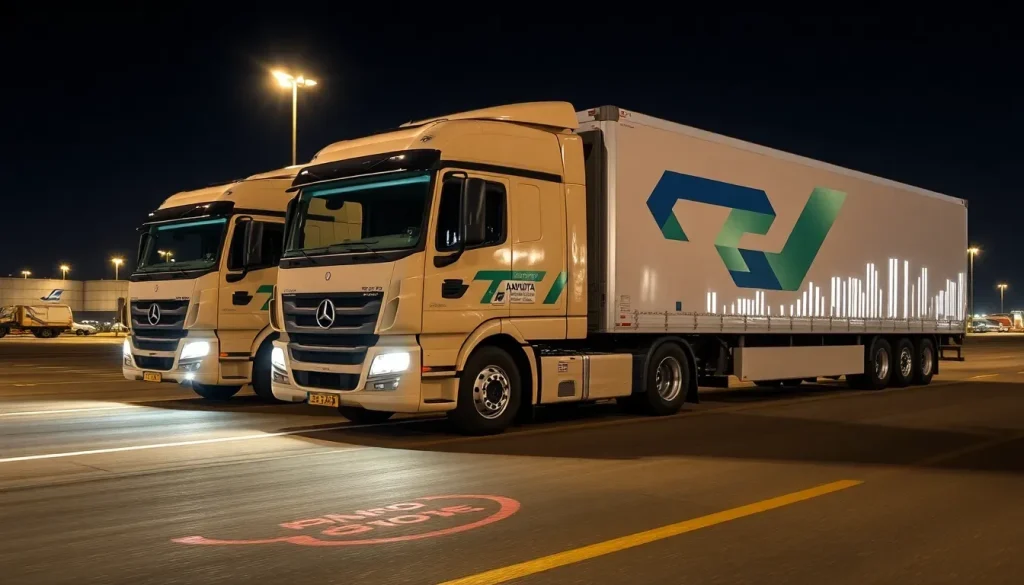Electric Trucks in Action: CEVA's Vehicles for Avolta at Barcelona Airport

As the world increasingly turns its focus toward sustainability, innovative solutions are reshaping industries. One such development is the electric truck initiative at Barcelona's airport, which exemplifies a forward-thinking approach to logistics and environmental stewardship. This article delves into the specifics of this groundbreaking project and its implications for the future of transportation.
- Introduction to CEVA Logistics and Avolta's Electric Truck Initiative
- Technological Advancements in Electric Trucks
- Environmental Benefits of Electric Logistics
- Design Features Tailored for Airport Operations
- Long-term Vision and Expansion Plans
- The Future of Electric Vehicles in Logistics
- Conclusion
Introduction to CEVA Logistics and Avolta's Electric Truck Initiative
CEVA Logistics, a leading global logistics company, in collaboration with Avolta, a pioneer in sustainable transport solutions, has launched a remarkable initiative at the Josep Tarradellas Barcelona-El Prat Airport. The project employs electric trucks to facilitate the environmentally friendly transportation of goods.
These electric vehicles operate in restricted airport areas, primarily transporting merchandise for Avolta's duty free shops. This innovative approach not only enhances operational efficiency but also significantly reduces environmental impact.
Technological Advancements in Electric Trucks
The electric trucks deployed by CEVA are equipped with cutting-edge technology that allows for rapid recharging, achieving a full charge in under two hours. This capability is crucial for maintaining operational efficiency in the fast-paced airport environment.
- Rapid Charging: Full charge in less than two hours, ensuring minimal downtime.
- Environmental Impact: Expected to decrease CO₂ emissions by nearly 70 tons annually.
- Innovative Design: Tailored to meet safety and operational standards specific to airport logistics.
Environmental Benefits of Electric Logistics
The integration of electric trucks into logistics operations represents a significant stride toward reducing the carbon footprint of the transportation sector. CEVA Logistics and Avolta's partnership aims to set a new standard in sustainable logistics.
By adopting electric vehicles, the companies contribute to a broader movement aimed at combating climate change and promoting sustainable practices across various industries. The projected reduction in CO₂ emissions at Barcelona Airport is a prime example of how targeted initiatives can yield substantial environmental benefits.
Design Features Tailored for Airport Operations
The electric trucks are not only efficient but also designed with specific features that align with airport infrastructure and operational needs. Key design considerations include:
- Height Restrictions: The vehicles maintain a total height of under 3 meters to comply with airport regulations.
- Optimized Interiors: Interior designs are geared towards maximizing delivery efficiency and safety.
- Safety Features: Incorporation of advanced safety measures to ensure secure operations within the airport environment.
Long-term Vision and Expansion Plans
The agreement between CEVA Logistics and Avolta outlines a six-year service period at the Barcelona airport. However, this initiative is just the beginning. Both companies have expressed interest in expanding this model to other international airports.
São Paulo, Brazil, identified as one of the largest urban centers in the world, is among the first locations under consideration for this expansion. The potential for implementing electric truck services in other major airports could reshape global logistics and contribute to more sustainable urban transport solutions.
The Future of Electric Vehicles in Logistics
This initiative showcases a growing trend in the logistics industry towards electrification and sustainability. As cities and countries worldwide commit to reducing emissions, electric vehicles are poised to play a crucial role in achieving these goals.
With ongoing advancements in battery technology, charging infrastructure, and vehicle design, electric trucks can become a viable alternative to traditional diesel-powered vehicles. The success of CEVA Logistics and Avolta's collaboration could inspire similar initiatives globally.
Conclusion
The partnership between CEVA Logistics and Avolta at Barcelona Airport signifies a critical step toward sustainable logistics. By embracing electric vehicles, these companies are not only improving operational efficiency but also addressing the pressing need for environmental responsibility in transportation. As this initiative unfolds, it may very well serve as a template for future endeavors in the logistics sector.




Leave a Reply